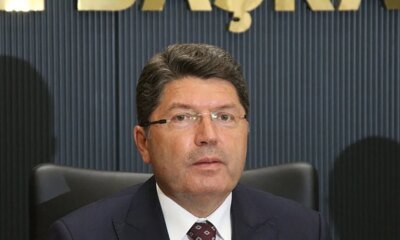Economy
Ex-Turkish central bank governor Süreyya Serdengeçti passes away at 73
Former Turkish central bank chief Süreyya Serdengeçti passed away on Saturday at the age of 73, local media reports said.
Serdengeçti, who served as the head of the Central Bank of the Republic of Türkiye (CBRT) from 2001 to 2006, is credited with lowering inflation to single digits during his tenure, which followed the 2001 economic crisis.
Within the same period, in 2005, Türkiye also transitioned to the new currency by dropping six zeros from the previous “old lira.”
Serdengeçti was born in Istanbul in 1952 and graduated from the Middle East Technical University in 1979 with a bachelor’s degree in economics. Later on, between 1984 and 1986, he studied in the U.S., where he earned a master’s degree in economics at Vanderbilt University.

In 1980, he began working in the Foreign Debt Repayment Department of the CBRT, and from 1982 onward, he served in the Foreign Exchange Operations Department. Upon his return to Türkiye, he continued to manage foreign exchange reserves at the central bank.
He held several other positions before being appointed as the governor of the central bank in March 2001 by then-State Minister for the Economy, Kemal Derviş.
“We have learned with sadness of the passing of Mr. Süreyya Serdengeçti, who served as the Governor of the Central Bank between 2001 and 2006. We extend our condolences to his family and all his loved ones, and pray for God’s mercy upon him,” the CBRT said in a statement on X on Saturday.
Economy
Fed expected to hold off on rate cuts again despite Trump pressure
The U.S. central bank is widely expected to hold off cutting interest rates again at its upcoming meeting, as officials gather under the cloud of a mounting pressure campaign by President Donald Trump.
Policymakers at the independent Federal Reserve (Fed) have kept the benchmark lending rate steady since the start of the year as they monitor the impact of Trump’s sweeping tariffs on the world’s largest economy.
With Trump’s on-again, off-again tariff approach – and the lagged effects of the levies on inflation – Fed officials want to see economic data from this summer to gauge how prices are being affected.
When mulling changes to interest rates, the central bank – which meets on Tuesday and Wednesday – seeks a balance between reining in inflation and the health of the jobs market.
But the bank’s data-dependent approach has enraged the Republican president, who has repeatedly criticized Fed Chair Jerome Powell for not slashing rates further, calling him a “numbskull” and “moron.”
Most recently, Trump signaled he could use the Fed’s $2.5 billion renovation project as an avenue to oust Powell, before backing off and saying that would be unlikely.
Trump visited the Fed construction site on Thursday, making a tense appearance with Powell in which the Fed chair disputed Trump’s characterization of the total cost of the refurbishment in front of the cameras.
But economists expect the Fed to look past the political pressure at its policy meeting.
“We’re just now beginning to see the evidence of tariffs’ impact on inflation,” said Ryan Sweet, chief U.S. economist at Oxford Economics.
“We’re going to see it (too) in July and August, and we think that’s going to give the Fed reason to remain on the sidelines,” he told Agence France-Presse (AFP).
‘Trial balloon’
Since returning to the presidency in January, Trump has imposed a 10% tariff on goods from almost all countries, as well as steeper rates on steel, aluminum and autos.
The effect on inflation has so far been limited, prompting the U.S. leader to use this as grounds for calling for interest rates to be lowered by three percentage points.
Currently, the benchmark lending rate stands at a range between 4.25% and 4.50%.
Trump also argues that lower rates would save the government money on interest payments and floated the idea of firing Powell.
The comments roiled financial markets.
“Powell can see that the administration floated this trial balloon” of ousting him before walking it back on the market’s reaction, Sweet said.
“It showed that markets value an independent central bank,” the Oxford Economics analyst added, anticipating, Powell, will be instead, more influenced by labor market concerns.
Powell’s term as Fed chair ends in May 2026.
Jobs market ‘fissures’
Analysts expect to see a couple of members break ranks if the Fed’s rate-setting committee decides for a fifth straight meeting to keep interest rates unchanged.
Sweet cautioned that some observers may spin dissents as pushback on Powell, but argued that this is not necessarily the case.
“It’s not out of line or unusual to see, at times when there’s a high degree of uncertainty, or maybe a turning point in policy, that you get one or two people dissenting,” said Nationwide chief economist Kathy Bostjancic.
Fed Governor Christopher Waller and Vice Chair for Supervision Michelle Bowman have both signaled openness to rate cuts as early as July, meaning their disagreement with a decision to hold rates steady would not surprise markets.
Bostjancic said that too many dissents could be “eyebrow-raising” and lead some to question if Powell is losing control of the board, but added: “I don’t anticipate that to be the case.”
For Sweet, “the big wild card is the labor market.”
There has been weakness in the private sector, with hiring rates below average and the number of permanent job losers increasing.
“There are some fissures in the labor market, but they haven’t turned into fault lines yet,” Sweet said.
If the labor market suddenly weakened, he said he would expect the Fed to start cutting interest rates sooner.
Economy
Trump, EU chief meet aiming for trade deal after long standoff
U.S. President Donald Trump and EU chief Ursula von der Leyen are expected to come together on Sunday in Scotland in a decisive push to resolve a months-long transatlantic trade standoff.
The clock is ticking with Trump vowing to hit dozens of countries with punitive tariffs unless they hammer out a pact with Washington by Aug. 1, with the EU facing an across-the-board levy of 30%.
Von der Leyen’s European Commission, negotiating on behalf of the EU’s 27 countries, has been pushing hard for a deal to salvage a trading relationship worth an annual 1.6 trillion euros ($1.9 trillion) in goods and services.
Brussels has coordinated closely with European capitals, whose diplomats are expected to meet swiftly to give their blessing to any deal struck at the leader level, if indeed Trump and von der Leyen see eye to eye.
Sunday’s sit-down will take place at 4:30 p.m. local time (15:30 GMT) in Turnberry, on Scotland’s southwestern coast – where Trump owns a luxury golf resort.
The 79-year-old said on arrival Friday he hoped to strike “the biggest deal of them all” with the EU.
Referring to von der Leyen simply as “Ursula,” Trump praised her as “a highly respected woman” – a far cry from his erstwhile hostility in accusing the EU of existing to “screw” the U.S.
Deal ‘in reach’
“I think we have a good 50-50 chance” of a deal, said the president – citing sticking points on “maybe 20 different things.”
The European Commission said Thursday it believed a deal was “in reach.”
According to European diplomats, the agreement on the table involves a baseline 15% levy on EU exports to the U.S. – the same level secured by Japan – with carve-outs for critical sectors including aircraft, lumber and spirits, excluding wine.
The EU would also commit to ramp up purchases of U.S. liquefied natural gas (LNG), as one of a series of investment pledges.
The European side was also hoping for a compromise on steel that could allow a certain quota to enter the U.S., with amounts beyond that taxed at 50%.
Hit by multiple waves of tariffs since Trump reclaimed the White House, the EU is currently subject to a 25% levy on cars, 50% on steel and aluminum, and an across-the-board tariff of 10%, which Washington threatens to hike to 30% in a no-deal scenario.
The EU has focused on getting a deal with Washington to avoid sweeping tariffs from further harming its sluggish economy, with retaliation held out as a last resort.
Should talks fail, EU states have greenlit counter tariffs on $109 billion (93 billion euros) of U.S. goods, including aircraft and cars – to take effect in stages from Aug. 7 – and Brussels is also drawing up a list of U.S. services to potentially target.
Beyond that, countries like France say Brussels should not be afraid to deploy a so-called trade “bazooka” to restrict access to its market and public contracts – but that would mark a major escalation with Washington.
Dealmaker credentials
Trump has embarked since returning to power on a campaign to reshape U.S. trade with the world.
But polls at home suggest the American public is unconvinced by his strategy, with a recent Gallup survey showing his approval rating at 37% – down 10 points from January.
Having promised “90 deals in 90 days,” Trump’s administration has so far unveiled five, including with U.K., Japan and the Philippines.
In addition to bolstering his dealmaker credentials, a headline agreement with the EU could bring a welcome distraction from the scandal around Jeffrey Epstein, the wealthy financier accused of sex trafficking who died in prison in 2019 before facing trial.
In his heyday, Epstein was friends with Trump and others in the New York jet-set, but the president is now facing backlash from his own MAGA supporters demanding access to the case files.
Economy
Türkiye sees exports to Africa near $10B in 1st half of 2025
Türkiye has seen its exports to Africa near $10 billion in the first half of 2025, according to the Turkish Exporters’ Assembly (TIM), with Morocco as the top recipient.
Morocco imported $1.8 billion worth of Turkish goods in January-June, leading the continent as improvements in bilateral relations and Türkiye’s proximity continued to boost trade.
Egypt followed with $1.6 billion in imports, while Libya received $1.3 billion. Other key markets included Tunisia with $554.1 million, South Africa with $303.5 million, and Nigeria with $242.3 million.
In terms of growth in value, Türkiye’s exports to Morocco increased by $345 million from the same period last year. Exports to Libya grew by $262 million, the Democratic Republic of Congo by $103 million, Niger by $91.5 million, and Ghana by $68.1 million.
Chemical products topped the list of Türkiye’s exports to the continent, totaling $1.3 billion. This was followed by cereals, grains, oilseeds and derivatives with $1.2 billion, steel with $942.4 million, textiles and raw materials with $675.5 million, and automotive products with $619 million.
Economy
Moody’s upgrades Türkiye’s rating, changes outlook to stable
Moody’s on Friday upgraded Türkiye’s ratings citing a strengthening track record of effective policymaking, easing of inflationary pressures and drop in economic imbalances, while changing the outlook to stable from positive.
The sovereign credit rating was raised from “B1” to “B3a”.
Moody’s said the upgrade reflects the strengthening track record of effective policymaking, more specifically in the central bank’s adherence to monetary policy that durably eases inflationary pressures, reduces economic imbalances, and gradually restores local depositor and foreign investor confidence in the Turkish lira.
The upgrade also reflects the view that the risk of a policy reversal has receded, although it will remain present in the coming years, it said.
The reason for the stable outlook was that it balances upside and downside risks to Türkiye’s credit profile.
“On the upside, extending the track record of effective policymaking without political interference has the potential to support the improvement in Türkiye’s external position more substantially than we currently assume,” Moody’s said.
“Furthermore, the government’s ongoing and planned structural reforms could improve Türkiye’s resilience to external shocks by further reducing its energy import dependence and increasing the competitiveness of exports,” it added.
In July 2024, Moody’s upped Türkiye’s credit ratings by two notches from “B3” to “B1” and changed its outlook to positive, marking its first upgrade for Türkiye in more than a decade.
The credit rating firm’s calendar for this year set the first credit rating review date for Türkiye as Jan. 24, but Moody’s had not made a decision regarding Türkiye’s credit rating at that time.
Economy
Türkiye says defense exports to ‘easily’ exceed $8 billion in 2025
Türkiye’s defense industry exports will exceed $8 billion “easily” in 2025, Trade Minister Ömer Bolat said on Friday, which would mark a new record in shipments that have more than tripled over just four years.
Bolat’s remarks came at the International Defense Industry Fair (IDEF) 2025 in Istanbul, which described as one of the most prestigious and impressive fairs in Türkiye’s history that has now become a global brand.
He said it represents the level of development Türkiye has achieved in the defense industry.
Past restrictions and embargoes have prompted Türkiye to develop a range of homegrown air, land and marine platforms, which eventually helped it seal billions of dollars worth of export deals in recent years.

The localization drive helped raise the domestic share in the defense industry to over 80%, up from just 20% in the early 2000s.
Türkiye’s defense and aerospace exports reached a record of nearly $7.2 billion last year, a nearly 30% increase from the previous year. The figure more than tripled compared to $2.28 billion in 2020.
“We continue to progress each year with increasing momentum,” said Bolat. “In the first six months of this year alone, we have already exceeded $3.5 billion, and sales are accelerating in the second half and toward the final quarter.”

“God willing, we will comfortably surpass $8 billion this year. The defense industry is making a major contribution to Türkiye’s export success,” said the minister.
Contribution to economy
Bolat said the defense industry, through the ecosystem it has established, adds significant value to the overall industry.
More than 3,500 firms operate in the industry, employing a qualified workforce of 100,000.
“We are talking about an annual production figure of $20 billion in the defense industry, and we have a strong defense industry exporting to over a hundred countries worldwide,” said the minister.

He pointed out that the defense industry will develop further, emphasizing that Türkiye is now among the strongest defense industrial countries in the Eurasian region.
“Countries in Africa, Asia, the Middle East, and even Europe, including South America, use Turkish defense industry products,” Bolat noted.
Bolat underlined that this is not merely an economic activity or a foreign currency-earning export effort.
“While it is extremely important from an economic and export perspective, the defense industry is also the guarantor of our independence. In recent years, we have witnessed intense wars, battles, and conflicts in the north, south, east and west of us. Amidst all that, Türkiye continues to develop like a pillar of stability, an island of peace,” he noted.

He attributed that to what he described as “strong army, strong economy, strong defense industry, strong leadership, and strong governance.”
“When you falter or face internal strife and unrest, progress halts and unfortunately, regression begins. For the past 20 years, Türkiye has been steadily advancing and developing, maintaining its rise and shining like a star in the Eurasian region,” Bolat added.
Economy
Meta to ban political ads in EU over ‘unworkable’ rules
Facebook and Instagram owner Meta announced on Friday that it will be forced to ban political advertising across its platforms in the European Union starting in October, citing what it described as “unworkable” regulations imposed by the bloc.
The EU has a bolstered legal armoury to rein in Big Tech, against which Meta has hit out with the support of the U.S. administration under President Donald Trump.
“This is a difficult decision – one we’ve taken in response to the EU’s incoming Transparency and Targeting of Political Advertising (TTPA) regulation,” the company said.
Political, electoral and social issue advertising will no longer be allowed from October in the bloc, it said, because of “unworkable requirements” under the new rules.
“Unfortunately, the TTPA introduces significant, additional obligations to our processes and systems that create an untenable level of complexity and legal uncertainty for advertisers and platforms operating in the EU,” Meta added.
The EU says its political advertising rules seek to increase transparency in online advertising after Facebook’s Cambridge Analytica scandal, which came to light in 2018.
Cambridge Analytica was a consulting firm that was found to have improperly accessed personal data from millions of Facebook users for targeted political advertising, particularly during the 2016 U.S. election and Brexit referendum.
The change is set to impact Meta’s flagship platforms Facebook and Instagram, as well as WhatsApp – which is largely ad-free but announced in June it would be introducing new advertising features in some parts of the app.
Meta said it was “not the only company to have been forced into this position.”
Google last year announced it would also prevent political advertising in the EU from October 2025 because of the “significant new operational challenges and legal uncertainties.”
Meta CEO Mark Zuckerberg has been highly critical of European rules, accusing Brussels in January of “censorship” and equating EU fines against the company to tariffs.
The latest row between Meta and the EU has been over the firm’s “pay or consent” system.
The EU imposed a 200 million euro ($235 million) fine in April after concluding Meta violated rules on the use of personal data on Facebook and Instagram.
The company faces additional daily penalties if it does not make changes, with Brussels yet to decide whether Meta has modified the platforms enough to avoid more fines.
Facebook and Instagram also face investigations under the EU’s mammoth content moderation law known as the Digital Services Act.
-

 Sports3 days ago
Sports3 days agoArda Güler left in cold as Mbappe snatches Real Madrid’s No. 10
-

 Refugees3 days ago
Refugees3 days agoTurkey mourns 5 volunteer firefighters killed battling wildfires
-

 Daily Agenda3 days ago
Daily Agenda3 days agoMinister of Justice Yılmaz Tunç: A deliberate smear campaign is being carried out
-

 Daily Agenda2 days ago
Daily Agenda2 days agoThe domestic meteor missile is coming: the button was pressed for Gökbora
-

 Daily Agenda2 days ago
Daily Agenda2 days agoCHP Beykoz District President came out of the Şile file
-

 Lifestyle2 days ago
Lifestyle2 days agoPlanning Paros: Traveler’s guide to Greece’s chicest island escape
-

 Politics3 days ago
Politics3 days agoTürkiye, Arab countries condemn Israeli parliament’s call to annex West Bank
-

 Daily Agenda2 days ago
Daily Agenda2 days agoEarthquake houses are rising rapidly – Breaking News




